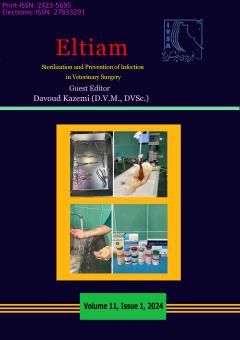Principles of preparation of surgical patient
Subject Areas : علوم جراحی دامپزشکی شامل جراحی های بافت های سخت و نرمAylar Moshtagh 1 , Seyedhosein Jarolmasjed 2
1 - Graduated from the Faculty of Veterinary Medicine, Islamic Azad University, Shabestar, East Azerbaijan, Iran.
2 - Associated Professor, Department of clinical Sciences, Veterinary faculty, Tabriz university, Tabriz, East Azerbaijan, Iran
Keywords: principles of preparation, surgery, anesthesia,
Abstract :
Background: A review of the principles of preparation of surgical patient
Objectives: Explaining the principles of preparation of surgical patient
Methods: A literature review using various publications related to preparation of surgical patient
Results: The main goal in preoperative care and preparation of surgical patients is to prevent harm and keep the patient safe before, during, and after the operation. The surgical procedure may be accompanied by the administration of anesthetic or local analgesia, which requires written consent from the patient's owner. Preoperative anesthesia assessment minimizes the risk for all patients and also identifies patients at risk. Special considerations should be applied to young, pregnant and elderly patients who undergo anesthesia and surgery. Preparing the patient for anesthesia requires an understanding of the preoperative condition, the nature of the surgery, and the anesthetic techniques required for the surgery as well as the risks that a particular patient may face during this time. Patients with underlying diseases need more careful examination and coordination. Preparation for surgery can take weeks, and if not performed sufficiently and correctly, it can cause delays and cancellations of surgery. Successful surgery requires correct diagnosis, selection of appropriate surgical methods and materials, attention to detail, accurate instruments and appropriate equipment. Appropriate instruments and sutures should be prepared before any planned surgery, and the surgeon should have adequate knowledge of the anatomy, procedure, and other requirements before performing the surgery. Before induction of anesthesia, fluid, electrolyte, and acid-base imbalances should be corrected.
Many drugs that are routinely administered during anesthesia are metabolized by the liver. In diseases with moderate to severe liver dysfunction, such drugs should be avoided or their dosage should be significantly reduced. Radiography is necessary to check the abnormalities of the digestive system.
Conclusions: Prehabilitation is a term that refers to any intervention that is performed before surgery to reduce the complications caused by surgery, reduce the length of hospitalization, accelerate the return of organ function, and facilitate the patient's return to normal life.
